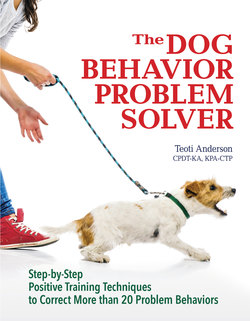Читать книгу The Dog Behavior Problem Solver - Teoti Anderson - Страница 2
На сайте Литреса книга снята с продажи.
ОглавлениеPart I: A LOOK AT BEHAVIOR AND TRAINING
Trust between owner and dog is an all-important essential.
You do NOT remember signing up for this. You distinctly remember the original dream. You wanted to add a dog to your family. You wanted a furry friend to love you no matter what. You wanted a sweet, loving companion—smart, friendly, and well-behaved enough to take anywhere. It was supposed to be perfect. It was going to be fun. It probably started out that way. But somewhere along the way, your dream of the perfect pet faded. You’re waking up to the fact your dog has some problems. And now you’re getting worried.
What happened? You know other people who have dogs like yours, and their dogs seem just fine. Your coworkers often laughingly share stories about their dogs’ funny antics. You have relatives who brag about their dogs’ accomplishments. Maybe you’ve had dogs before who were so easy to live with. Why did this dog turn out differently? How did living with an adorable, beautiful dog turn into such a hassle? Is your dog just … broken? More importantly, can you fix him?
You’re not alone, even though it surely feels like it sometimes. Please don’t despair. You already made the decision to help your dog, and that’s a positive step!
Dog Differences
Any time you bring a different species into your home, you’re going to encounter challenges. You see the world very differently from the way your canine friend does. You certainly have different distractions. You have better sight, he has better senses of smell and hearing. The way you perceive the world around you affects your actions in it. For example, you might be distracted by the sight of a friend in the distance, while your dog becomes obsessed with the scent of a steak grilling two blocks away.
You process information differently as well. People primarily communicate verbally, while dogs are much more adept at reading and signaling through body language. Humans are capable of saying one thing while meaning another, while dogs are unfailingly honest creatures. You always know where you stand with a dog. People, not so much. Is there any wonder miscommunication occurs?
You have different priorities. You may be obsessing over a business deadline while your dog lives for you tossing him a tennis ball. Dogs also have different skill sets than we do … skills that involve chewing, pulling, jumping, digging, and other behaviors. We adore dogs for what they are while at the same time getting annoyed at what they do. Sometimes problem behaviors are minor. Sometimes they are quite serious.
Studies have shown that behavioral problems are a top reason why people relinquish their dogs to shelters and other rescue organizations. Common problems cited include aggression toward people and other pets, a tendency to escape, destructiveness indoors and outdoors, hyperactivity, house soiling, and disobedience. This doesn’t mean that all shelter dogs have problems. Far from the case! There are other reasons for relinquishment, such as people moving and unable or unwilling to take a dog with them, divorces, deaths in the family, lack of money to care for a dog adequately, and more. But behavioral problems frequently top the list.
Some people get in over their heads with a dog who has problem behaviors. Sometimes, a dog’s problem is much more than his owner bargained for, while other times people make the mistake of not doing their research before bringing a dog into the home. Whatever the motive, the fact that behavioral reasons are a prime reason for relinquishment should tell you that problem behaviors are fairly common with our canine friends. Don’t be fooled by all those perfect dog stories you compare your dog to … it may be that you just hear the nice Fido stories and not the naughty ones!
Just because your dog has a problem behavior does not make him “defective.” Each and every dog has a unique personality and individual characteristics all of his own. He’s one of a kind. Your dog just happens to have some problem issues you need to address. It also doesn’t mean that you’re crazy for loving him. He may pose challenges, but he’s still the fluffy bundle of joy you brought home. There was a reason why you chose this dog. There was something about his spirit … his eyes … the way he interacted with you … that spoke to your heart. He’s taken up residence there now, even though he does try your patience.
So what do you do about it? Take positive steps to figure out what is contributing to your dog’s behavior and how to address his specific issues.
With time, patience and training, you can have a well-behaved dog.
